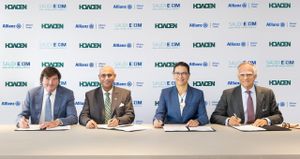The Indonesian government has officially agreed to lift the sales ban on Apple's iPhone 16, concluding lengthy negotiations between Jakarta and the tech giant. According to government sources who spoke to AFP, this pivotal resolution marks the end of months of discussions aimed at satisfying local investment regulations.
Indonesia initially imposed the sales ban on the iPhone 16 model back in October after Apple failed to meet regulations manding 40% of its devices be produced using local parts. This requirement is part of Indonesia's broader initiative to increase foreign investments from major tech companies and bolster local manufacturing capabilities.
While the specifics of the agreement have not yet been disclosed, it is clear this outcome signals progress for both parties. A government source noted they could not share any details about the terms or when they will be made public.
Previously, Indonesia rejected Apple's proposal for a $100 million investment, with officials citing the proposal's unfairness compared to Apple's investments shown elsewhere. This setback prompted Apple to revise its approach, leading to the company eventually offering $1 billion for the construction of a factory to produce AirTags within the country.
Agus Gumiwang Kartasasmita, Indonesia’s Minister of Industry, had expressed disappointment over Apple not meeting government requirements adequately, especially when compared to its investments in other regions. His statements highlighted the government’s focus on fairness and equitable contribution from global tech firms.
Despite the ban on commercial sales, unofficial estimates suggest thousands of iPhone 16 devices have entered Indonesia. By the end of 2024, approximately 9,000 units have been brought to the country by individual users without breaking any laws, as personal imports were still allowed.
This sales ban wasn't exclusive to Apple's devices; Indonesia also prohibited the sale of Google's Pixel phones for similar reasons related to local manufacturing standards and the failure to meet the 40% local component requirement.
Significantly, last year, Apple’s CEO Tim Cook visited Indonesia to explore investment avenues. During his visit, Cook engaged with Indonesian leadership, including former president Joko Widodo and current defense minister Prabowo Subianto, to discuss Apple's strategic plans for Southeast Asia, emphasizing broadening the company’s influence and investment footprint within the region.
Since the announcement of the iPhone’s sales ban, the story's developments have been closely watched by the Indonesian public and tech enthusiasts, who are eager to see how the lifting of this ban will affect the available technology and overall market dynamic.
With this new agreement, there is hope for improved relations between the Indonesian government and Apple, potentially opening doors for future projects and collaborations as both parties seek to establish sustainable business models within the region. Balancing local manufacturing needs with corporate investment interests will be key to success as Indonesia continues to encourage foreign companies to invest responsibly.



